- Friday, 5 September 2025
Nepali arts hold global identity for Nepal: VP Pun
Kathmandu, April 15: Vice President Nanda Bahadur Pun asserted that the Nepali arts held a global identity for Nepal. He said Nepal is rich in natural and cultural arts. Inaugurating the National Fine Arts Exhibhition-2079 BS at Nepal Academy of Fine Arts (NAFA) in Kathmandu today, VP Pun recalled the national luminary Araniko who, according to the VP, held the head of Nepal high abroad through arts. Expressing his happiness over the wide reach of Nepali arts across the world, Pun recalled the pride he had taken to see Nepali folk and modern arts exhibited in Austrian capital-Vienna- some years ago. Stating that Nepali arts, which had over 2,000 years of history, were being created in various genres and techniques lately unlike in traditional form in the past, he underscored the State's support in preserving and conserving the arts. The VP shared that his interest spanned the field of fine arts. On the occasion, NAFA's chancellor Kancha Kumar Karmacharya said that the exhibition would run for a month. A total of 426 paintings by 365 artists from all over the country are on display in the exhibition. VP Pun, on the occasion, awarded senior fine artist duo Krishna Manandhar and Surya Bahadur Chitrakar with 'Araniko Pragya Samman' carrying a purse of Rs 100,000 for each. Similarly, journalist Devendra Thumkeli received 'National Fine Arts Writing Award' while Sushila Tamang was awarded 'Fine Arts Journalism Award'. Also, seven artists were awarded the 'National Fine Arts Award' in different categories and 17 with 'Fine Arts Special Award'. Seven artists from seven provinces received the 'Lalitkala Provincial Award'.
14 new cases, 55 recoveries in 24 hours
Kathmandu, April 15: With 14 new cases of COVID-19 confirmed on Friday, the nation's novel coronavirus tally has reached 978,648.In 3,030 Real-Time Polymerase Chain Reaction (RT-PCR) tests done in the past 24 hours, a total of 14 persons were found infected with SARS-CoV-2, informed the Ministry of Health and Population (MoHP) in its regular update.Likewise, the virus infection was detected in zero people in 873 antigen tests performed in the last 24 hours.Currently, there are 438 active cases of COVID-19 across the nation of which, 19 are admitted to various institutional isolation while 419 patients are placed in home isolation.Of the active patients, nine are admitted to the ICU and one is under treatment with the ventilator facility.Meanwhile, 55 COVID-19 patients receiving treatment in institutional isolation or staying in home isolation recovered from the infection in the last 24 hours. Nepal has now recorded 966,259 cases of recovery, and the recovery rate is at 98.7 per cent.The MoHP on Friday added zero COVID-19 related fatalities to the nation's COVID-19 death toll, which has now reached 11,951.
Provincial, district committees of ruling parties likely to be asked to forge consensus on electoral coalition by April 13
Provincial, district committees of ruling parties likely to be asked to forge consensus on electoral coalition by April 13 NBA decides not to issue LC for import of essentialsChief Minister Rai calls for opening export-oriented industriesCPN (Unified Socialist) forms Election Mobilization Committee Influx of devotees in Muktinath (Photo Feature) Former Finance Ministers draw government's attention to economy Chief Minister Rai calls for opening export-oriented industries Provincial, district committees of ruling parties likely to be asked to forge consensus on electoral coalition by April 13Issues of price increment of petroleum goods will be resolved: Minister Badu Chinese Ambassador Hou Yanqi sings Nepali song Resham Felili Chief Minister Rai calls for opening export-oriented industries Buddhakrishna piercing his tongue for the ninth time, says it'll be his last Issues of price increment of petroleum goods will be resolved: Minister Badu We are trying to have more Nepali workers in Japan: Deputy Assistant Minister Iwamoto Three new cases, 48 recoveries in 24 hours Buddhakrishna piercing his tongue for the ninth time, says it'll be his last IAEA Says Ukraine Has Requested Help Safeguarding Nuclear Plants Buddhakrishna piercing his tongue for the ninth time, says it'll be his last 2,593 foreign tourists arrived in Nepal yesterday Three new cases, 48 recoveries in 24 hours CPN (Unified Socialist) forms Election Mobilization Committee We are trying to have more Nepali workers in Japan: Deputy Assistant Minister Iwamoto Buddhakrishna piercing his tongue for the ninth time, says it'll be his last Former Finance Ministers draw government's attention to economy Chinese Ambassador Hou Yanqi sings Nepali song Resham Felili IAEA Says Ukraine Has Requested Help Safeguarding Nuclear Plants Three new cases, 48 recoveries in 24 hours Former Finance Ministers draw government's attention to economy Provincial, district committees of ruling parties likely to be asked to forge consensus on electoral coalition by April 13
We are positive to participate in local level elections: Prakanda
Kathmandu, April 15: A meeting has been held between Home Minister Bal Krishna Khand and Netra Bikram Chand 'Biplav'-led CPN (Maoist) spokesperson Khadga Bahadur Vishwakarma 'Prakanda'.During a meeting at the Home Ministry on Friday, Prakanda said that they were positive to participate in the local elections.Home Minister's Press Coordinator Madhusudhan Bhattarai said that the party was demanding the release of party leaders and cadres jailed on various charges and the withdrawal of the charges against them.Both sides have stated that they have reached the final stage of agreement as the talks held repeatedly on this issue have been positive.After the government started the process of withdrawing the issue which can be withdrawn according to the law, the talks became governmental and came close to an agreement.During the meeting, Home Minister Khan said that the process of withdrawing the case has started.
Buddhakrishna piercing his tongue for the ninth time, says it'll be his last
Provincial, district committees of ruling parties likely to be asked to forge consensus on electoral coalition by April 13 NBA decides not to issue LC for import of essentials Provincial, district committees of ruling parties likely to be asked to forge consensus on electoral coalition by April 13 NBA decides not to issue LC for import of essentials
Govt. accepts USD 659 million grant from U.S.
Kathmandu, April 15: The government has accepted USD 659 million in grant aid from the United States Agency for International Development (USAID).This information was given by the government spokesperson Gyanendra Bahadur Karki while announcing the decision of the cabinet meeting held on April 13.He said that the decision was made to accept 659 million dollars in grants from the United States Agency for International Development (USAID).The meeting also decided to accept a concessional loan of USD 150 million from the World Bank Group's International Development Association.Similarly, the meeting has decided to appoint Additional Inspector General of Armed Police Pushpa Ram KC as the Inspector General of the Armed Police Force and to accept the resignation of Ram Adhar Kapar, Chairman of National Housing Company Limited.
Fourth shot protects against severe Omicron outcomes; COVID may increase risk of rare eye blood clots
By Nancy Lapid, April 14 (Reuters) - The following is a summary of some recent studies on COVID-19. They include research that warrants further study to corroborate the findings and that has yet to be certified by peer review.The fourth vaccine dose protects against Omicron for at least a monthA fourth dose of the COVID-19 vaccine from Pfizer (PFE.N) and BioNTech (22UAy.DE) provided significant added protection against severe disease, hospitalization and death for at least a month in older individuals, according to a study from Israel conducted when the Omicron variant was dominant.The estimated effectiveness of the fourth dose during days 7 to 30 after it was administered compared with a third dose given at least fourth months earlier was 45% against infection, 55% for symptomatic disease, 68% for hospitalization, 62% for severe disease and 74% for death, the research team reported on Wednesday in The New England Journal of Medicine. The study compared 182,122 individuals aged 60 and older who received a fourth dose and 182,122 very similar people who had received a third dose but not a fourth."The results of our real-world study suggest that a fourth vaccine dose is, at least initially, effective against the Omicron variant," the researchers said. "Additional follow-up will allow further assessment of the protection provided by the fourth dose over time." A recently published larger Israeli study that looked only at rates of breakthrough infections and serious illness after the fourth dose found that efficacy waned quickly versus infection but held steady versus severe illness.COVID-19 may increase the risk for rare eye clotsPatients with COVID-19 may have an increased risk of rare vision-threatening blood clots in the eye for months afterwards, new findings suggest.Because SARS-CoV-2 infections increase the risk of blood vessel obstructions at other sites in the body, researchers studied nearly half a million COVID-19 patients to see whether they would develop clots in the veins or arteries of the retina, the nerve tissue at the back of the eye that receives images and sends them to the brain. Over the next six months, 65 patients had a retinal vein occlusion. While that number is low, it reflects a statistically significant 54% increase compared with pre-COVID infection rates, according to a report published on Thursday in JAMA Ophthalmology. Retinal artery clots were 35% more common after COVID-19 than before, but that difference might have been due to chance. The clots most often occurred in patients with other conditions that increased their risk of blood vessel problems, such as diabetes, high blood pressure, and high cholesterol.Clot risk did not appear to be associated with the severity of the coronavirus infection. The study cannot prove that COVID-19 caused the clots in these patients' eyes, the researchers noted, saying larger studies of the issue are needed.Risk of breakthrough infections tied to psychiatric problemsPeople with mental health problems are at higher risk for breakthrough infections after receiving COVID-19 vaccines, new data show.Researchers in California tracked more than a quarter of a million fully vaccinated patients in the U.S. Veterans Affairs health system. Nearly all were men, and roughly half had received at least one psychiatric diagnosis in the past five years. Overall, 14.8% developed COVID infections despite vaccination. Compared to study participants without a psychiatric diagnosis, those over age 65 with substance abuse, psychotic disorders, bipolar disorder, adjustment disorder or anxiety faced up to a 24% higher risk of breakthrough infections, the study found. For those under 65, risks were up to 11% higher than for those without a psychiatric history, the researchers reported on Thursday in JAMA Network Open."Our research suggests that increased breakthrough infections in people with psychiatric disorders cannot be entirely explained by socio-demographic factors or pre-existing conditions," said study leader Aoife O'Donovan of the San Francisco VA Health Care System. "It's possible that immunity following vaccination wanes more quickly or more strongly for people with psychiatric disorders and/or they could have less protection to newer variants."
Govt. positive to address demands: Home Minister Khand
Kathmandu, April 15: A meeting has been held between the Government of Nepal and the Janamat Party led by Sike Raut.In a meeting held at the Ministry of Home Affairs on Friday, discussions were held on the implementation of the previous agreements between the government and the Janamat Party.The government team was led by Home Minister Bal Krishna Khan and Janmat Party Chairman Raut.
Road To Success Of Gurkha Justice Campaign
Dr. Mulibir Rai, The Anglo-Nepal relationship began in the middle of the Anglo Nepal war from 1814 to 1816. One particular battle event led two adversaries to shake hands and befriend each other. Lieutenant (Later General) Frederick Young did not flee the battle with his men. Instead, he became captive to the Gorkhalis. As he was asked why he had not run away. His stark and manly reply – "I have not come so far to run away," astonished the Gorkhali Army. They treated the officer like a guest rather than a captive. The hostility turned into friendship at once. While the war was still scrambling to its equivocal conclusion in 1816, the formation of the Gurkha regiments, not one but three, was already underway in mid-1815 at Young's request, approved by General David Ochterlony. Hence, Young bragged, “I went in as one man and came out as three thousand.” The number continuously grew throughout the century until the cold war settled in the early 1990s.Gurkhas' ValourEver since, the Gurkhas’ valor resonated in every battle, from the Pindari War in 1817 to the recent Operation Herrick in Afghanistan. They achieved over three thousand medals for bravery, including thirteen Victoria Cross at the cost of over 44,000 lives. Numerous eulogies and testimonials from the British Commanders permeate the British military literature. Among them is a famous statement by former Indian Army Chief of Staff Field Marshal Sam Manekshaw: "If a man says he is not afraid of dying, he is either lying or he is a Gurkha." Some critics may find this overly magnified version of appreciation of the Gurkhas’ selfless commitment to building the British Empire. However, its authenticity can be validated only by those British commanders, including Major James Rutherford Lumley, father of a renowned British actor Juana Lumley, who would not have survived the battle had the Gurkhas not been there to protect them. Only the biblical texts can appropriately put this selfless phenomenon: "Greater love has no one than this, that he lays down his life for his friends." Professor Sir Ralf Turner remembers his Gurkha comrades, "uncomplaining and enduring hunger and thirst and wounds, and at the last, your unwavering lines disappear into the smoke and wrath of battle. Bravest of the brave, most generous of the generous, never had a country more faithful friends than you."Unfortunately, with the ending of the wars, the friendship abruptly ended unilaterally. Gurkhas were told, ‘Aba ladȃi sakiyo, tapaiǹharu januhos; War has ended, now you go home." Gurkhas simply grinned and left for a home virtually empty-handed, leaving thousands of fellow Gurkhas dead behind. Yet, Gurkhas' service in the British Army has continued with the same loyalty and courage throughout the centuries. Ironically, the British who invariably portrayed the Gurkhas as fearless and peerless soldiers in literature never made even the slightest effort to honour their own words in practice. It has been over two decades since the Gurkhas began the Gurkha justice campaign making a gentle demand for equality in pay and pensions. Approximately 40,000 Gurkhas had joined the movement in the 1990s. The number gradually dwindled to less than 15,000 now, meaning many Gurkhas died without the pension, which they sincerely hoped for decades. More than 70,000 Gurkha offspring are in the Middle East, Malaysia, and other South-East Asian parts, toiling for mere subsistence. Had the British Government taken sensible and appropriate action by offering equal pay and perks to the Gurkhas, their offspring would have certainly been in a better position as Gurkhas could have afforded a good education.For the UK Government, the demise of many hopeful Gurkha veterans and their offspring’s travails could be nothing. Still, it is evident exploitation of the salt of the earth and a shameful failure of the British Government, whom we once considered the world's empire and champion of human rights, to deliver justice to the demised ones and their offspring. As the UK Government’s injustice to the Gurkhas continues, the Gurkhas recall the morbid history of their side. During the great wartime, there was no household in the hills which would not have lost at least one family member in the war. Furthermore, the study shows that as the British began recruiting the best and bright youths of the indigenous groups from the hills of Nepal into the British army, there was a massive brain drain among these groups. As a result, their representation in Nepalese politics, administration and bureaucracy remained ominously empty and dangerously absent. Moreover, the British Government's ill-favored behaviors toward the Gurkhas added insult to injury, which is far more painful than the one they sustained from bullets on the battlefield.Justice CampaignThe Gurkha justice campaign initiated by the GEASO (Gurkha Ex-Serviceman Organisation) in the early 1990s took well over a decade to pulsate in the British parliament, even though the movement had begun to yield some results in installment in 2004. At least not until Peter Carroll, a Liberal Democrat political party member whom Joanna Lumley calls a “driving energy” actor Joanna Lumley herself and the Liberal Democrats’ Leader Nick Clegg drove full pelt 2009, was the UK government serious about grievances of the campaigners, the GAESO and BGWS. As a result, the UK Government announced the settlement rights for the Gurkhas. The Guardian wrote that “The move comes as a major victory for The Sun’s crusade for Gurkha justice” and it was celebrated across the Gurkha community both in the UK and Nepal. Lumley famously remarked that Gordon Brown was "a brave man who made a brave decision on behalf of the bravest of the brave." She shed tears of joy. Martin Howe, one of the legal team representing the Gurkhas, David Enright and many MPs openly commented on themselves as proud MPs who felt proud to fight for the brave Gurkhas' settlement right. It was indeed a watershed moment in the history of the Gurkhas in the British Army. However, unfortunately, these proud MPs had little or no knowledge that whilst the “historic announcement” was being made in the British Parliament, thousands of veterans were fighting the poverty, disease and injury they sustained on the battlefield. The new ‘historic announcement’ on pension applied to those who joined the British Army after 30 September 1993.To that effect, for the Gurkhas, it was just a half-done job; hence, the campaign continued. One of the campaign groups, BGWS filed the case with the ECHR (European Court of Human Rights). The court's verdict was delivered: The Court was satisfied that Gurkha soldiers had been treated differently from other soldiers in the British Army as concerned their entitlement to a pension and that the difference in treatment could be regarded as less favourable.Court BattleFurthermore, given the changes to the Gurkhas' situation, the Court accepted that by 2007- the date of the offer to transfer-Gurkha soldiers had been in a similar situation to other soldiers in the British Army. However, the Court considered that any difference in treatment on grounds of nationality had been objectively and reasonably justified. In particular, the cut-off point, 1 July 1997, for different treatment of accrued pension had not been arbitrary as it represented the transfer of the Gurkhas had started forming ties with the country.Likewise, the Court considered that any difference in treatment based on age had also been objectively and reasonably justified.Given the above statement made by the court, there seemed to have no points from the aggrieved party been taken into consideration; hence the verdict resembled nothing but a foregone conclusion rather than the justice made out of a thorough investigation. However, the BGWS somehow appeared to be convinced by the verdict.The remaining campaign groups, including GAESO, UBGAE, and other freshly formed groups, with added, so-called 13 points demands, pressed on to finish the unfinished business. A founding leader of Satyagraha Gyanraj Rai staged the third round of hunger strikes in London. Staging a hunger strike is considered not an effective practice to achieve objectives unless, like Nelson Mandela, a global icon of freedom puts, the outside world learns of it. From the Anglo-Irish war in the early 18th century to the recent insulate Britain campaign, the track records show that the hunger strikes seemed to have little impact on success as the British Government knows how to wheedle strikers. We have even witnessed a similar event in Nepal. Dr Govinda K.C. staged hunger strikes on multiple occasions demanding corrections in the Government’s bureaucratic policies within the medical sector, including affordable tuition fees for students from the working-class background, all to no avail. Governments worldwide have a universal template to deal with hunger strikes - make a promise first and break it later. Hence, the next move of the British Government is almost visible that it will propound its formulaic plan that is not to seek retrospective amendment in pension. The letter dated 17 March 2022 from Lt Gen Wardlaw, Colonel Commander of the Brigade of Gurkhas, to Major (Retired) Bhimbahadur Gurung, Chairman of the RAN, is a cue to the outcome of impending talks between the so-called GtoG (Government to Government). This article, by no means, alludes that the Gurkhas will have the same fate - grinning and bearing it; however, it strongly suggests that there are some preliminary actions to be taken and precautions to be considered to achieve success. Setting theoretical and analytical discourse on how the Gurkhas have to prepare for the justice battle aside, the most critical and immediate action is to be united unconditionally. It is a no-brainer that "united we stand divided we fall". This is the universal truth. Scholars have tested it on politics, psychology, social studies, physics and biology. So much so that it has been examined on clonal integration and its relationship to invasiveness. IntegrationThe study demonstrated the "general performance benefits of clonal integration, at least in the short term, and suggest that clonal integration contributes to the success of clonal plants." No logic can and will refute this truth/theory. Unfortunately, the Gurkhas seem to have ignored the fact that division leads only to demise for we see at least five different Gurkha campaign groups heading to the same destination - justice. Some groups have a louder voice for dignity and integrity than others. They claim that the demand for dignity and integrity will be fulfilled only if Gurkhas are treated as equally as their British counterparts. Other groups too have the same demand - equal treatment. It is common to have different opinions, but only a few find a wise way to churn those opinions and produce cream beau ideal. In the Gurkhas' context, the objective, vision and mission are clear, the direction is straightforward, the paraphernalia is in place, and the vehicle is ready. Furthermore, the setting from which the Gurkhas are launching the assault is oriental, and the position in which the Gurkhas are is subaltern. Therefore, the author strongly believes that the Gurkhas' unity is "the key" to securing victory over injustice.(A former Gurkha British soldier, Dr. Rai holds a PhD and currently teaches at a London-based college)
Personal Events Registration Week begins
Kathmandu, April 15 : Personal Events Registration Week has begun in Tokha municipality of Kathmandu from today. The Department of National Identity Card and Civil Registration has launched the Week at the municipality till April 20. Mayor Prakash Adhikari said that registration of personal events like birth, death, marriage, divorce and migration have been started in all wards of the municipality. He also requested all Tokha folks to participate in the Week. The municipality has asked the citizens, who are eligible to get social security allowance, to register their details in the ward office. Tokha municipality has 11 wards.
Bhanubhakta Zoological Garden to count bird number
Damauli, April 15 : Bhanubhakta Zoological Garden located at Byas municipality in Tanahu district is to count number of birds. The Zoological Garden is going to carryout bird census on the occasion of Wildlife Week. Conservation Officer of the Garden, Bhojraj Pantha, said that number of birds would be counted at the forest areas covered by the Garden. Birds of 185 species have been spotted in the Garden so far, he added. Record of bird spices found in course of monitoring of birds is kept. The Zoological Garden that spans on 425 hectares of area has incorporated 13 forest areas. Meanwhile, 27th Wildlife Week has begun in Tanahu from Thursday. The Bhanubhakta Zoological Garden has organised the Wildlife Week under the slogan 'Human-Wildlife Co-Existence: Our Common Responsibility'. Inaugurating the Wildlife Week, Chief District Officer Bishwo Prakash Adhikari, stressed that human should accept coexistence of wildlife. Saying conflict between human and wildlife takes place due to non-acceptance of human-wildlife existence, he added that existence of both- human and wildlife is equal. Adhikari laid the emphasis on the need of launching public awareness programmes for human-wildlife coexistence. The Zoological Garden would organise various programmes for a week on the occasion of Wildlife Week.
Anti-virus shutdowns in China spread as infections rise
BEIJING Apr 15 , (AP) — Anti-virus controls that have shut down some of China’s biggest cities and fueled public irritation are spreading as infections rise, hurting a weak economy and prompting warnings of possible global shockwaves.Shanghai is easing rules that confined most of its 25 million people to their homes after complaints they had trouble getting food. But most of its businesses still are closed. Access to Guangzhou, an industrial center of 19 million people near Hong Kong, was suspended this week. Other cities are cutting off access or closing factories and schools.Spring planting by Chinese farmers who feed 1.4 billion people might be disrupted, Nomura economists warned Thursday. That could boost demand for imported wheat and other food, pushing up already high global prices.The closures are an embarrassment to the ruling Communist Party and a setback for official efforts to shore up slumping growth in the world’s second-largest economy. They come during a sensitive year when President Xi Jinping is expected to try to break with tradition and award himself a third five-year term as leader.Beijing has promised to reduce the human and economic cost of its “zero-COVID” strategy, but Xi on Wednesday ruled out joining the United States and other governments that are dropping restrictions and trying to live with the virus.“Prevention and control work cannot be relaxed,” Xi said, according to the official Xinhua News Agency. “Persistence is victory.”The risk that China might tumble into recession is increasing, Ting Lu, Jing Wang and Harrison Zhang of Nomura warned in a report.“The logistics crunch is worsening,” they said. “The markets should also be concerned about the delayed spring planting of grain in China.”The government reported 29,411 new cases Thursday, all but 3,020 with no symptoms. Shanghai accounted for 95% of that total, or 27,719 cases. All but 2,573 had no symptoms.A health official warned Wednesday that Shanghai didn’t have the virus under control despite its easing restrictions.Some 6.6 million people were allowed to leave their homes in areas that had no new cases for at least a week. But at least 15 million others still are barred from going outdoors.Most people have obeyed despite grumbling about shortages of food, medicine and access to elderly relatives who need help. But videos on the popular Sina Weibo social media service show some trading punches with police.Grape Chen, a data analyst in Shanghai, said she was panicking about getting medicines for her father, who is recovering from a stroke. She called police after getting no response from an official hotline but was told quarantine rules bar officers from helping.“We are willing to cooperate with the country,” Chen said. “But we also hope that our lives can be respected.”The city government of Suzhou, a center for smartphone manufacturing and other high-tech industry west of Shanghai, told its 18 million people to stay home when possible.Taiyuan, a blue-collar city of 4 million in central China, suspended inter-city bus service, according to the official China News Service. Ningde in the southeast barred residents from leaving.A restaurant cook in Taiyuan said his family has been confined to their apartment compound since April 3 after cases were found in neighboring compounds.“Our lives will be seriously affected if the restrictions last long,” said the cook, who would give only his surname, Chen.“My wife and I are earning nothing,” Chen said. “We have three children to support.”All but 13 of China’s 100 biggest cities by economic output are under some form of restrictions, according to Gavekal Dragonomics, a research firm.“The intensity is increasing,” Gavekal said in a report this week.The volume of cargo handled by the Shanghai port, the world’s busiest, has fallen 40%, according to an estimate by the European Union Chamber of Commerce in China. Automakers have suspended production due to disruption in deliveries of supplies.Restrictions on areas that produce the world’s smartphones, consumer electronics and other goods are prompting forecasters to cut expectations for this year’s economic growth to as low as 5%, down sharply from last year’s 8.1% expansion.The ruling party’s target is 5.5%. Growth slid to 4% over a year earlier in the final quarter of 2021 after tighter official controls on debt triggered a collapse in home sales and construction, industries that support millions of jobs.Even before the latest shutdowns, the ruling party was promising tax refunds and other help for entrepreneurs who generate wealth and jobs.Premier Li Keqiang, the No. 2 leader and top economic official, called this week for “quicker rollout” of aid for businesses that face a “key juncture for survival,” China News Service reported.Under a strategy dubbed “dynamic clearing,” authorities are trying to use more targeted measures to isolate neighborhoods instead of whole cities with populations bigger than some countries. But some local leaders are imposing more sweeping controls.Shanghai leaders were criticized for trying to minimize economic damage by ordering testing but no shutdown once cases were found last month. A citywide shutdown was ordered with only a few hours’ warning after case numbers soared.That was in contrast to Shenzhen, a tech and finance center of 17.5 million people near Hong Kong that closed the city March 13 after an outbreak and ordered mass testing. It reopened a week later and business returned to normal.Guangzhou has imitated Shenzhen. Most access to the city of 19 million was suspended Monday and mass testing ordered after 27 infections were found.Li Guanyu, a 31-year-old woman in Guangzhou, said residents can leave her apartment compound only once every other day to buy food but stores are well-stocked.“This happened a bit suddenly,” said Li. “Maybe the Shanghai situation is so bad that Guangzhou started mass testing and lockdowns as soon as cases were discovered.”
3 months after volcanic eruption, Tonga slowly rebuilds
By NICK PERRY , WELLINGTON, New Zealand Apr 15 , (AP) — Samantha Moala recalls she was taking a shower at her home in Tonga when she heard what sounded like a gunshot so powerful it hurt her ears.As she and her family scrambled to their car to drive inland, ash blackened the sky. The world’s biggest volcanic eruption in 30 years sent a tsunami around the globe, and the first waves washed across the road as Moala drove to safety at the airport with her terrified husband and two sons.A volunteer with the Tonga Red Cross, Moala, 39, was soon attending to the cuts other people had suffered as they escaped, and giving them psychological support. She said about 50 of them stayed for two days at the airport until they got the all-clear to go back home.“People were all shocked,” she said. “But I got to mingle with them, help them, get them to be confident. It’s a small little island, and we got to know each other in two hours.”Three months after the eruption, Tonga’s rebuilding is slowly progressing, and the impact of the disaster has come into clearer focus. Last week, the prime minister handed over the keys to the first rebuilt home of the 468 the government plans to reconstruct across three islands as part of its recovery program.Some 3,000 people whose homes were destroyed or damaged initially sought shelter in community halls or evacuation centers. Eighty percent of Tonga’s population was impacted in some way.In the first few weeks after the eruption, Moala helped out by putting up tents and tarpaulins, and then by cooking food for other volunteers.It took five long weeks for Tonga to restore its internet connection to the rest of the world after the tsunami severed a crucial fiber-optic cable. That delayed some families from abroad from being able to send financial help to their loved ones.Three people in Tonga died from the tsunami and a fourth from what authorities described as related trauma. The sonic boom from the eruption was so loud it could be heard in Alaska and a mushroom plume of ash rocketed a record 58 kilometers (36 miles) into the sky.The World Bank estimates the total bill for the damage is about $90 million. In the small island nation of 105,000 people, that’s equivalent to more than 18% of gross domestic product.The bank noted that many coastal tourism businesses — which bring in vital foreign revenue for Tonga — were particularly hard hit, with tourist cabins and wharves destroyed. The agriculture industry also suffered, with crops lost and reef fisheries damaged.The ANZ bank says Tonga’s GDP will likely contract by 7.4% this year, after it had been expected to grow by 3.7% before the volcano erupted.The international community has been helping out, with Tonga able to secure $8 million in funding from the World Bank and $10 million from the Asian Development Bank, as well as aid assistance from many places including Australia, New Zealand, Japan, the European Union, the U.S. and China.But progress has been hampered by the nation’s first outbreak of COVID-19, which was likely brought in by foreign military crews who raced to drop off supplies as the ash cleared. The outbreak prompted a series of lockdowns, and the country remains in a state of emergency.Moala is among the more than 8,500 Tongans who have caught the coronavirus since it began spreading through the islands. Eleven people so far have died. Moala said the outbreak had affected many businesses, including her husband’s work as a tattoo artist.But as the outbreak ebbs and the rebuilding progresses, the islands’ familiar rhythms are returning for many people.Among those who remain most affected are the 62 people who lived on Mango Island and about another 100 on Atata Island who may never be able to return home.The islands are located very close to the Hunga Tonga Hunga Ha’apai volcano, and the villages were completed wiped out. Residents have now been offered land by Tonga’s king to relocate onto one of Tonga’s two main islands.Sione Taumoefolau, the secretary-general of the Tonga Red Cross Society, said there is a lot of work to be done relocating the residents.It’s also been slow-going getting supplies to people on other far-flung islands, he said. Many of them remain without internet access after a domestic fiber-optic cable was also damaged and will likely not be repaired for months.“Three months later, people are starting to get back to normal,” Taumoefolau said. “But we can see they still need psychological and social support, those that were really impacted, especially those who have to relocate.”
Liverpool reach semis to raise quadruple hopes
APLiverpool, Apr 15 : A place in the Champions League semifinals secured. The dream of an unprecedented quadruple of trophies still intact. Key players rested amid a hectic schedule.Liverpool is in a good place entering the home straight of what could turn out to be the club’s greatest ever season.Even conceding two late goals to draw 3-3 at home to Benfica couldn’t take the smile of Jurgen Klopp’s face. “The day we qualify for the semifinals of the Champions League and I’m not happy, please come here and knock me out,” the Liverpool manager said Wednesday after seeing his team advance from the quarterfinals 6-4 on aggregate.With Liverpool inflicting significant damage by winning the first leg 3-1 in Lisbon last week, Klopp was confident enough to rest stars like Mohamed Salah, Sadio Mane, Virgil van Dijk and Trent Alexander-Arnold for a return match against Benfica that turned into a wild, end-to-end contest at Anfield.Roberto Firmino’s second-half double put Liverpool 3-1 ahead on the night and 6-2 ahead on aggregate, only for Klopp’s team to ease off the pace. Benfica took advantage by getting behind Liverpool’s makeshift defense to score through substitute Roman Yaremchuk and rising star Darwin Núñez, but the gap was too much to make up. “It was pretty comfortable,” Liverpool captain Jordan Henderson said, “but we’re disappointed with the goals we conceded.”Ultimately, Liverpool has coasted into the last four of Europe’s top club competition and is there for the 12th time — tying the record for an English team with Manchester United — and the first since the last of its six title triumphs in 2019. Villarreal awaits Liverpool in the last four. Ibrahima Konaté followed up his goal in the first leg — his first both for Liverpool and in the Champions League — with another header to open the scoring off Kostas Tsimikas’ outswinging corner.Gonçalo Ramos made it 1-1 in the 32nd minute — keeping Benfica in with the unlikeliest of chances — with a goal that had a hint of fortune about it. The ball ricocheted to the 20-year-old forward from a tackle by Liverpool midfielder James Milner and his finish from the edge of the area was emphatic past Alisson. Firmino is no longer first choice for Liverpool following the arrivals of Diogo Jota and Luis Diaz but the Brazil striker staked his claim for a starting spot in the team’s big upcoming games with a double in the space of 10 minutes.His first goal came after mistakes from goalkeeper Odysseas Vlachodimos, who fumbled as he attempted to gather a through-ball, and center back Jan Vertonghen, who hurried his resulting clearance. Jota drove the ball back into the middle of the area and Firmino applied the finish in the 55th. The Brazilian volleyed in Tsimikas’ free kick to make it 3-1 but Liverpool let Benfica back into the match.
Para Sports Must Not Suffer
Meenraj PantheeThe Winter Para Olympics-2022 successfully concluded a few weeks ago in Beijing, reiterating loudly that sports remain a basic human right issue of every individual irrespective of their status in society. President of the International Paralympics Committee (IPC) Andrew Parsons made a pertinent statement during the opening ceremony of the Beijing Winter Paralympics: "At the IPC, we aspire for a better and more inclusive world, free from discrimination, hate, ignorance and conflict." President Parsons made an immensely persuasive message before the world that articulated a whole-hearted aspiration and feeling of the athletes gathered there representing 46 different countries and disability communities around the world as a whole. The practice of “One Bid, One City” for organising Olympics and Paralympics has taken place since 2001, in which every city that bids to host the Olympics will also bid to hold the related Paralympics, which vindicates the equal importance of both competitions. Since 2001 the Paralympics is held in the same city encompassing the same facilities, spirit and enthusiasm related to the corresponding Olympic Games. Under IPC's disability classification categories for Paralympics, athletes compete in six different disability groups - amputee, cerebral palsy, visual impairment, deafness, spinal cord injuries, and intellectual disability. Apart from this, there are some other categories, in which an athlete does not fit into one of the other categories, such as dwarfism. Within each group, athletes are further divided into classes based on the type and extent of their disabilities. Individual athletes may be reclassified at later competitions if their physical status changes. The size and diversity of the Paralympic games have increased significantly over the years due to an increased demographic range of the athletes. For example, the Paralympics in 1960 hosted 400 athletes from 23 countries participating in 8 sports, the summer Paralympics held in London 2012 had 4,200 athletes representing 164 countries participated in 20 sports, the Tokyo summer Paralympics had a total number of 22 sports with 550 events with badminton and taekwondo being added for the first time. Para Sports In NepalThe evolution of Nepal’s Para sports movement has witnessed many twists and turns. These forms of sports remained in the grip of certain powerful people who served their interests. The participation and representation of persons with disabilities from Nepal in various international tournaments commenced in the late 1970s under the initiation of one of the pioneer organisations, initially called Nepal Association for the Disabled and Blind. Several disabled athletes such as Surya Kumari Gurung Mahattara, and Laxmi Subedi did not only take part in various international tournaments but also were able to win international medals for Nepal even before the restoration of multi-party democracy in Nepal in 1990. Surya Kumari Gurung, one of the medal winners, recalls their diligent preparation before competing. Nepal’s participation in the International Special Olympics events is a source of great pride. An exciting period was witnessed when the Nepal Paralympics Committee (NPC) officially opened its doors after fulfilling all requirements to be a legal entity back in 1995 under the initiation and leadership of persons with disabilities and their parents. The NPC possesses a strong commitment and dedication following the motto, "nothing about us without us", which develops the potential of persons with disabilities in sports activities in Nepal. Gradually, the NPC was gaining popularity as it pledged a variety of tournaments to be conducted continuously making a level playing field at various levels in a systematic way for the first time despite facing financial and other resource constraints. Consequently, the NPC was thereby officially authorised and recognised by the country's sports governing body, Nepal Sports Council to develop and advance sporting activities for persons with disabilities. In the course of this evolution, other sports organisations, even disability-specific sport-related organisations came into being, and have jointly with the NPC been engaged in achieving their set objectives, i.e. Nepal Cricket Association of the Blind, Table Tennis Association for Persons with Physical Visual and Hearing Disabilities, Spinal Cord Injury Sports Association etc. Though NPC and its Member organisations were continuously engaged in organising sports events and preparing athletes to compete at national and international sports competitions, the above developments were not always able to continuously flourish. Parasports have often been embroiled in the ongoing conflict between NPC and NPSA since then as NPSA fails to respect the court verdict and law of the land along with forging consensus among concerned stakeholders until now. The problem is further exacerbated while the IPC is continuously supporting NPSA to represent Nepal, without being informed of the decision of the Supreme Court and without having the official support of the government.Thus, on one hand, the government has authorised the NPC to play a lead role to deal with Para sports development and on the other hand, the NPSA has been representing athletes in international events causing a lot of confusion and demotivation amongst athletes with disabilities. Experienced SportspersonsThe experienced sportspersons with disabilities argue that due to the conflict the process of training and sending qualified athletes from Nepal to take part in international games has suffered a setback. Instead of sending the competitive athletes to international events, those less deserving have gone to the Paralympics games for the past 18 years, depriving the qualified and deserving athletes of Nepal to take part in those events. As a result, the participation of athletes from Nepal in the Paralympic competitions in the past has been quite limited, despite the availability of many Paralympic categories to compete. Nepal's participation in Tokyo's Paralympics last summer was limited to only one athlete while none of the Nepali para-athletes participated in Beijing Winter Paralympics. It shows the level of dysfunctional nature, lack of commitment and accountability on the part of the NSC and Paralympic committee. A significant amount of budget has been allocated and invested in the recent years for the advancement of para-sporting activities through the Ministry of Youth and Sport. SetbacksOther setbacks restricting the Para movement could be a dearth of technical and financial resources, centre based patchy programs, a low priority from the government and development partners, and split and fragmented attitudes among stakeholders rather than making an effort combined. Hence the government is required to introduce an appropriate policy and programme complying with Article 30 of the UN Convention on the Rights of Persons with Disabilities and domestic sports development-related legislation to address para-sporting activities at various levels, eg local, provincial, national and international. It is now imperative for the NSC, the Youth and Sports Ministry and the government to ensure the involvement of all pertinent stakeholders alongside disabled people's organisations making a concerted effort in the concerned sector. The government and the IPC are to be responsible to redefine the para-sports movement in compliance with the verdict of the Supreme Court of Nepal. Indeed, sports have emerged as one of the best tools to empower and tap the unlimited potential of children and adults with disabilities. Sports help for their rehabilitation, both socially and functionally. (Panthee is a freelance writer)





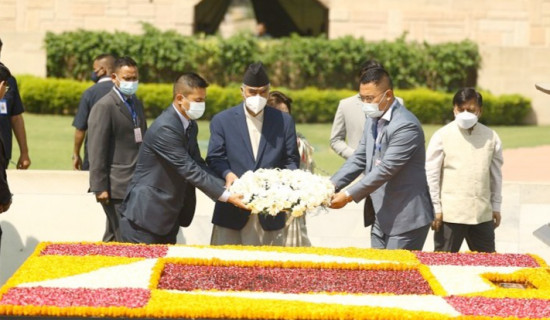
-original-thumb.jpg)
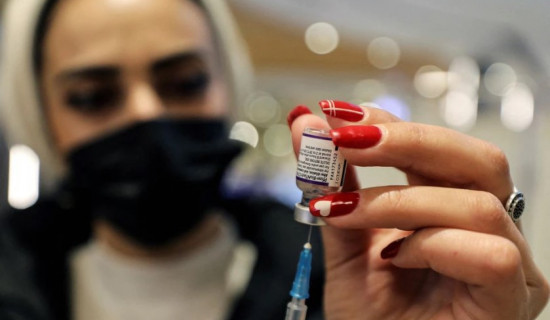
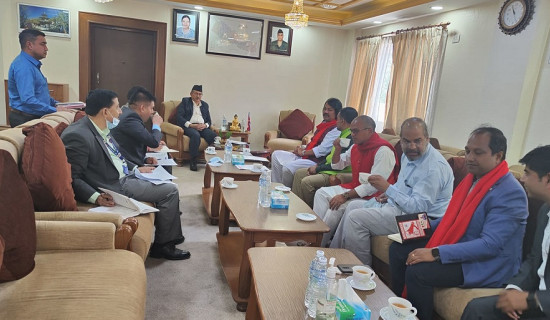
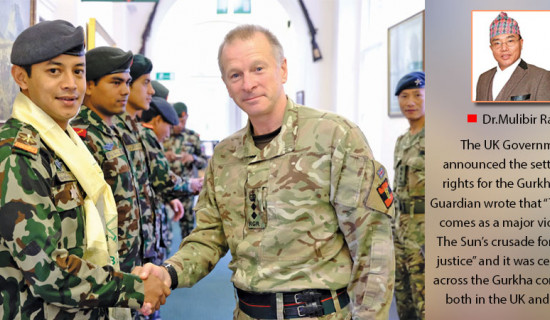
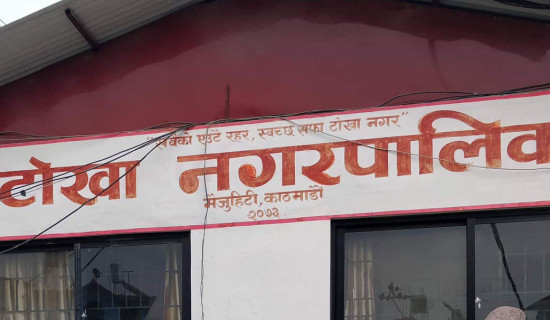
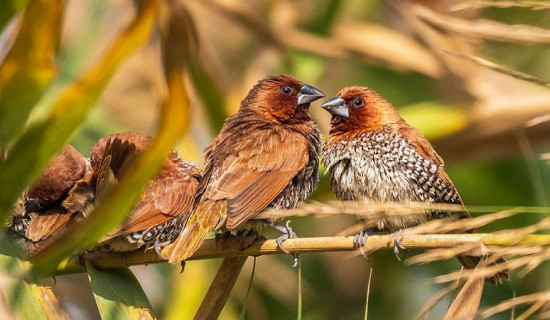
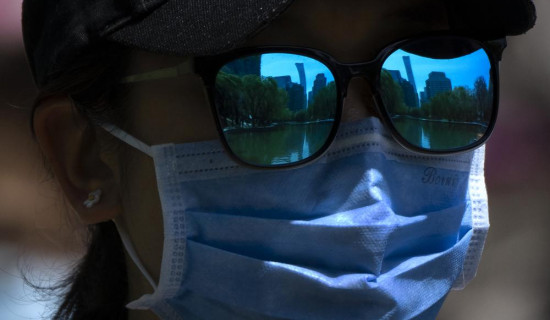
-original-thumb.jpg)


